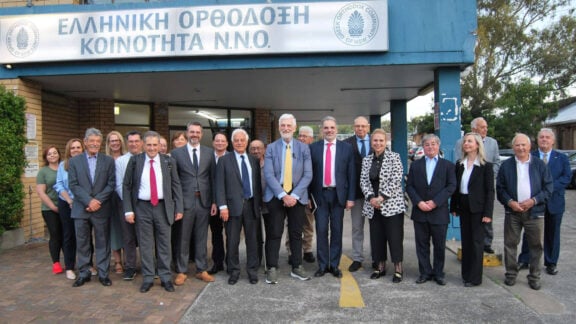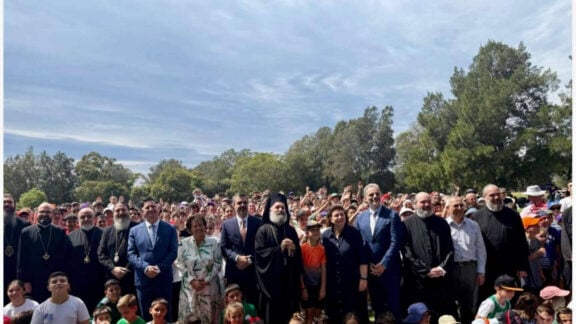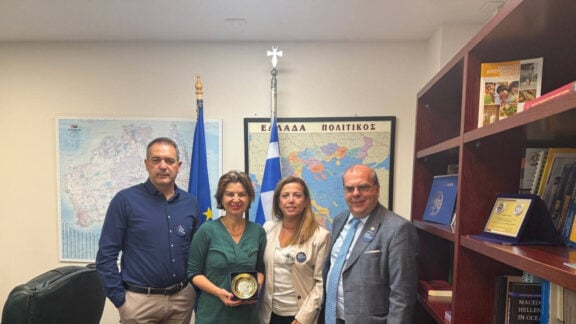You can study the language for years, watch the movies, listen to the music and grow up amidst the stories and traditions.
But the reality is nothing beats a trip to Greece for the deep dive effect it can offer in its culture, language and people.
A group of lucky Melbourne youngsters had the opportunity to do this as a team, touring Athens and Greece for almost 20 days during Greek summer. Some “a bit more jam-packed” than what they would like, they tell Neos Kosmos, but each one rich in experiences, many of them ‘eye-opening’ and ‘not touristy’.



The initiative was spearheaded by the Pancretan Association of Melbourne in collaboration with the Hellenic National Defence General Staff and supported by the Region of Crete authorities. A total of $13,000 raised by the Cretan Village were allocated to cover the needs of the trip.
The parents who joined the team of 12 as their chaperones, Nick Koukouvitakis, John Mavroulis and Dora Papamakarios, Angelica Frangoudis and Manolis Starakis, are also to credit for making the trip possible

Neos Kosmos met with the group – with ages ranging from 10 to 18 – at the Greek Centre upon their return to Melbourne to document their experience.
Minutes before the roundtable interview, the Pancretan Association president, Manolis Starakis, was addressing the group.
“You did a great job,” he said congratulating them for exhibiting responsible behaviour while travelling, as well as for owning every minute of experiences they were offered, despite busy schedule demands.
The success of the inaugural initiative, Mr Starakis said, paved the way for more to follow and he told Neos Kosmos they will soon start planning next year’s trip opening it to up to 40 participants.
“You know how many parents approached me the other day at an event after seeing the pictures on Facebook to ask me ‘How do we get our kids on this’?”
“You guys should feel very privileged. You saw things no one else would get to see.”
Mr Starakis was not exaggerating in his comments.
Athens: Two weeks of must-do-and-see ‘touristy’ stuff, the military, the cruise and more
The first two weeks of the trip were spent in Athens, with the youth group ticking all the boxes in the sightseeing agenda.
But a big part of their tour was hosted by the nation’s military, giving them rare access to otherwise restricted areas like submarines, and one-on-ones with officials, including the Chief of the Hellenic Armed Forces.

Dimitri Petrakis gives an overview:
“We were hosted at the military resort, we got to see all their bases, had lunch with officials, we got to see the ins and outs of units in the Air Force, Navy and Special Forces. And the more touristy stuff as well, archaeological, historical, war museums, the Parthenon, so it was both a military tour and cultural experience.”




“I feel very privileged,” says Jorge Mavroulis.
“Because, who’s having the experience of being able to go into airplanes and submarines and have lunch with the General? ”
The military tour stood out for many, as well as being privy to information like ‘how long it takes for an Air Force officer to leave their Athens desk, take off and reach the border with Turkey once they become aware of an airspace violation’. (It takes between seven to nine minutes by the way).
“I really enjoyed seeing the submarines and the airplanes from so close,” Zois Mavroulis shares.
“Going to the Air Force Base was a highlight of the trip for me,” says Steve Koukouvitakis, recalling the “loud impact of the fighter jets”.
The military personnel did not go unnoticed either by the young travellers.
Lily Koukouvitakis briefs Neos Kosmos on the “filoxenia shown by the military” while Angelica Starakis describes how they witnessed “at the army base how hard they have to train and how they are ready to just go in an instant willing to fight and serve for their country.”

When asked whether they would think of joining the Greek army, the boys of the group had mixed responses. But something the whole group agreed on was that they were exposed to “quite a bit of discussion regarding sovereignty and maintaining borders”.

Part of the Athens itinerary was set out by the military. So how did kids cope with the tight schedule?
“In Athens the schedule was a bit tiring but I still think it was all worth it. Crete was a lot more relaxing,” Jorge Mavroulis explains with everyone nodding.
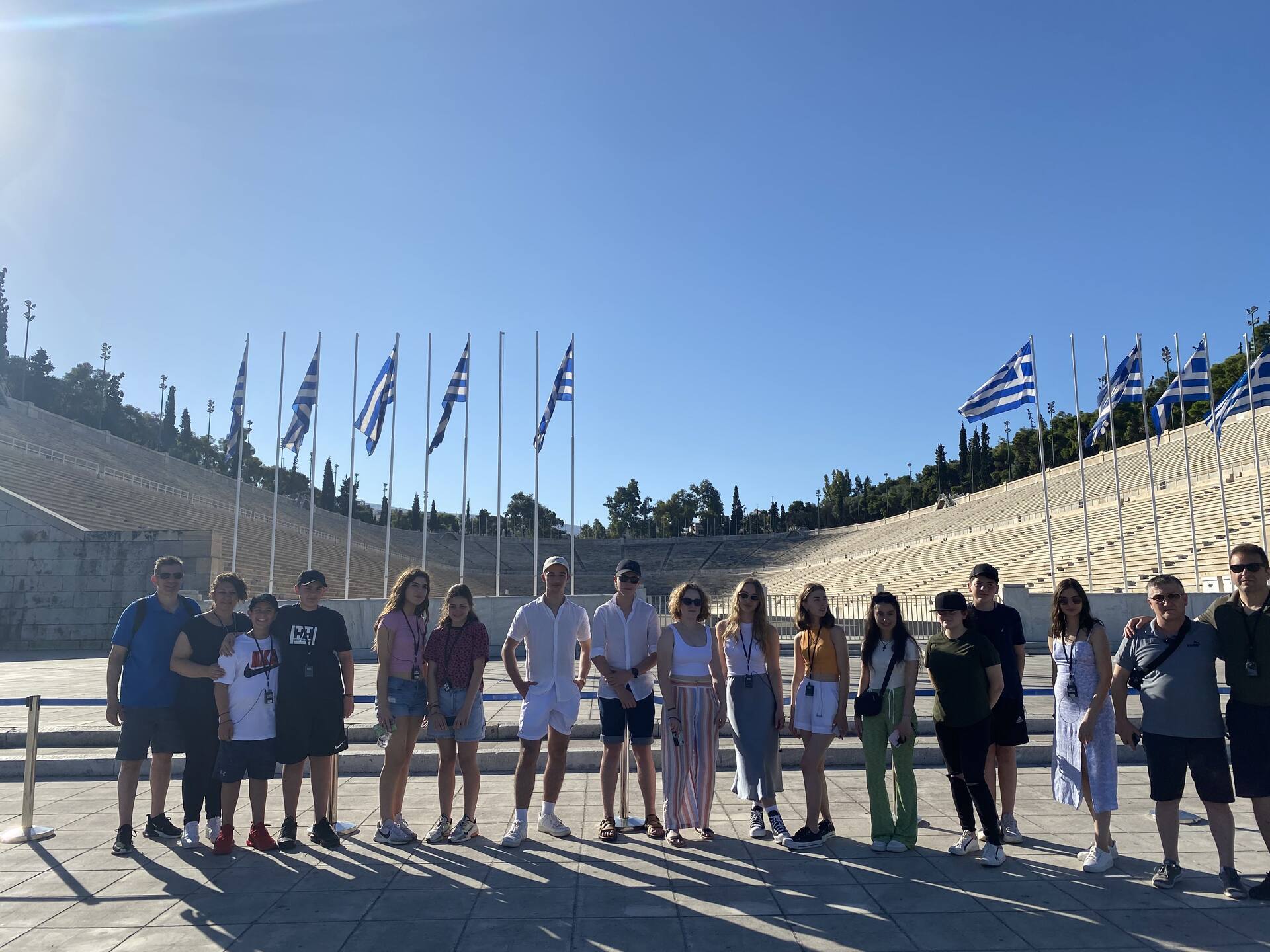



Still, the group managed to make use of all their time at the Greek capital, going for day walks and seeing some of its nightlife.




“We went to a rooftop bar and we could see the Acropolis in the view. It was nice to have a late night out with everyone,” Anastasia Frangoudis recounts.

Ellie Koukouvitakis, the youngest of the group shares the same feeling: “We had a great time. It was nice having a mocktail and getting to know everyone better.”
“The best thing about the nightlife,” George Parras adds, “other than experiencing the Greek culture was spending time will all these people here from the association.”
An island hopping cruise saw the group spending time by the beach and absorbing the Greek sun.



“I really enjoyed our day cruise to the three islands Hydra, Poros and Aegina although my favourite was Hydra where I rode a donkey,” says Anastasia Frangoudis.

“We had some time to relax but then we also had some time to explore the islands. I would like to go back.”



Crete: Connecting with past and language, traditional food, and making friends to stay
An outdoor cinema night and a paintball session were among activities the travelling group managed to squeeze in before the second destination of the trip: Crete.
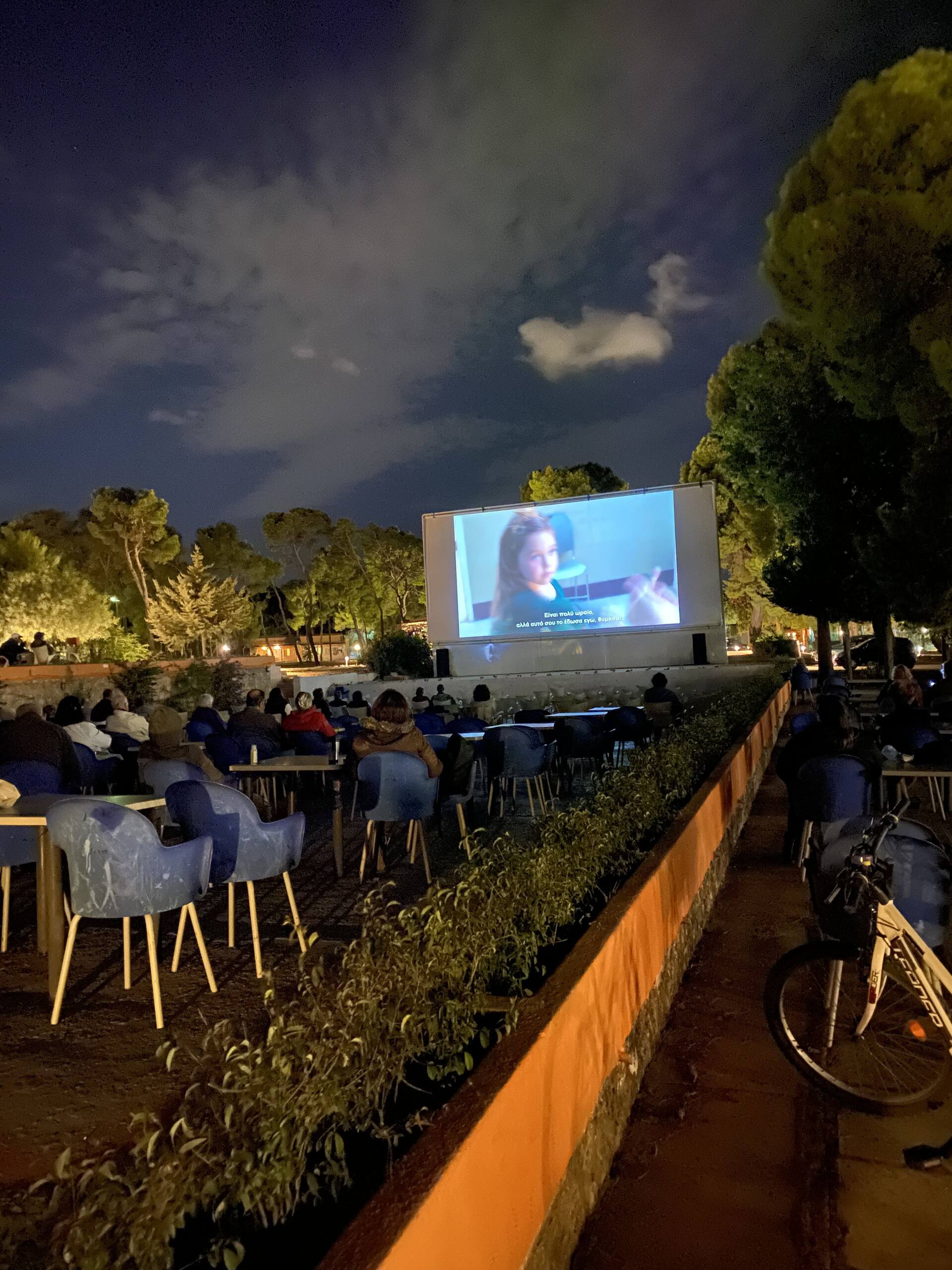

Anastasia Starakis describes her experience of Cretan life.
“We went out a lot and we had the freedom to experience the culture and be out on the streets. We also had a lot of dinners which helped us grow closer, obviously enjoying good food and sitting for hours on end.”
Not hard to imagine, food was a highlight on its own.

“The food in Greece is so much better than in Australia because it’s more authentic and it’s a better climate to grow crops, they use much less chemicals,” Steve Koukouvitakis says.
Thinking of comparisons to the Aussie environment, Zois Mavroulis can’t help notice:
“You wouldn’t find a cafe on every single road in Australia, and there were a lot of things, restaurants and shops that are open till late.”
Close distances between places was a key advantage for their island stay, Dimitri Petrakis reflects.
“We’d finish up from what we were doing, whether it was visiting a museum or Knossos for example, and we could go out, get some food or just go for a walk. It was just really relaxing the ease of getting around the city, an experience that you won’t get here in Melbourne.




At that stage of the trip, bonds had already formed within the group.
“So we had each other’s backs,” someone’s voice is heard as conversations overlap. Everyone is keen to talk about Crete. No wonder.



“It felt like much more of an intimate experience,” says Krystel Parras.
“All our parents are from there, some of our families have homes so they knew Crete […] It was much easier to stray from the itinerary so that was a good change of pace.”

Natassa Starakis has been to Greece four-five times already.
“I liked Crete and Irakleio better as I knew my way around. I enjoyed the fact I could remember old parts and get asked ‘where are you from’ and being complimented on my Greek’.”
Krystel Parras remembers a similar experience and highlights the overall effect the trip had on their Greek.
“We were out for dinner in Irakleio and someone asked us if we were locals. So, that was nice because even with our limited Greek and despite speaking English for the majority of the time amongst ourselves, I feel like we definitely became more immersed in the language itself.
“Either our Greek improved or we found some passion to improve it ourselves back in Australia.”

The trip, Krystel says, “turned out to fulfill all expectations and exceed some, I think. Being the oldest [of the group

Music was part and parcel of the trip.
“We listened to a lot of Cretan traditional music,” Ellie Koukouvitakis remembers. “Some songs were familiar to me, others I hadn’t hear before.”

“I think Crete was more focused on cultural ties and our personal and family ties,” Lily Koukouvitakis says explaining that as part of the trip they visited the villages of the Starakis and the Koukouvitakis families, Zofori in Iraklio and Aradena in Sfakia respectively.
“I think it was eye opening for the majority of the group, because we haven’t really seen where our grandparents actually were from and their life experiences. It was definitely not touristy at all what we did there, not learning about Ancient Greece, we were more learning about the modern history of Greece.”

Natassa Starakis adds to the reflection: “We were able to sit down and see family and see how everything’s different from the living in Australia versus the living in the horio as well as living in the central part of Athens and all these places that we went to.”

A core idea behind the trip, Dimitri Petrakis says, “was to encourage more kids of second and third generation to go to Greece, integrate with that culture and connect back to their legacy. Just show them what Greece has become.”

Whether or not this happens in the near future, it looks like the trip has already fulfilled a range of other purposes.
George Parras describes the personal impact it had on them, “I think everyone in Greece was so kind to us when realising we also had Greek heritage. And it was beautiful to know I have a second home in Greece.”


And Angelica Starakis’ words encapsulate the collective feeling: “It might sound cheesy,” she says with a smile, “but honestly my favourite experience was building the connection with these people. When we come together again and talk about these memories and looking back at the pictures of what we saw and did together, I think this connection encompasses everything.”



